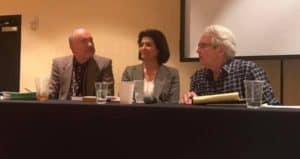
Queen Elizabeth I of England finished ahead of two other candidates in the voting on the question of “Who is the Dark Lady of Shakespeare’s Sonnets?” after a spirited three-way debate at the Shakespeare Oxford Fellowship’s annual conference, held this year in Oakland, California. On October 13, the third day of the conference, debaters Hank Whittemore, arguing in favor of Queen Elizabeth; John Hamill, arguing for Penelope Rich; and Katherine Chiljan, arguing for Anne Vavasour, were each allowed 20 minutes to make their case for their candidate, then had 5 minutes each to rebut the others’ arguments. All three debaters agreed that Edward de Vere, the 17th Earl of Oxford (referred to in this post as “Oxford”), writing under the pseudonym “William Shakespeare,” was the real author of the Sonnets.
Shakespeare’s Sonnets 127 to 152 introduce a personage known by commentators as the “Dark Lady.” The author of the Sonnets clearly has a love-hate relationship with the Dark Lady, and there appears to be some kind of triangular relationship involving the author, the Dark Lady, and the “Fair Youth,” i.e., the young man to whom most of the Sonnets are addressed. All three debaters agreed that the Fair Youth was Henry Wriothesley, 3rd Earl of Southampton, a young man of arresting beauty, to whom Shakespeare’s two long narrative poems, Venus and Adonis and The Rape of Lucrece, were expressly dedicated.

Hank Whittemore argued that the Dark lady’s blackness referred not to her hair or eyes, but to her deeds: “In nothing art thou black save in thy deeds.” When Southampton was convicted of treason for his involvement in the Essex rebellion, Elizabeth refused to save him from execution (Southampton was eventually pardoned and released by King James I after Elizabeth’s death.). Oxford was deeply frustrated by Elizabeth’s failure to pardon Southampton and by her stubborn refusal to settle the question of her succession before she died.

John Hamill argued that Penelope Devereux Rich, sister of the Earl of Essex, was the Dark Lady. Penelope had five children by her husband and six children from an extramarital affair. Hamill argued that Penelope also had an affair with Southampton. He stated that the anonymous 1594 poem, “Willobie His Avisa” (WHA), provided clues to the Dark Lady’s identity. WHA retells the ancient Greek myth of Penelope and Ulysses about a “chaste and constant wife” who is pursued by suitors. Two suitors are identified as H.W. and W.S., which are generally accepted as Southampton (Henry Wriothesley) and Shakespeare (Oxford). Hamill argued that many of the details about Avisa fit Penelope Rich, thus identifying her as the Dark Lady.

Katherine Chiljan argued that Anne Vavasour, Oxford’s dark-haired mistress and mother of his illegitimate son, was the Dark Lady. Vavasour’s affair with Oxford led to Romeo-and-Juliet-like street brawls between Vavasour’s family and Oxford and his servants. Oxford was injured in a duel with Vavasour’s uncle in 1582. Chiljan hypothesized that Oxford resumed his affair with Vavasour after Oxford’s wife died in 1588. Like Hamill, Chiljan believes that “Willobie His Avisa” provides clues to the Dark Lady’s identity, but she argued that the clues pointed to Anne Vavasour, not to Penelope Rich.
You may click on the following links to read: Dark Lady Sonnets, Hank Whittemore’s essay on Queen Elizabeth, John Hamill’s essay on Penelope Rich, and Katherine Chiljan’s essay on Anne Vavasour. The final vote tally was Queen Elizabeth – 41, Anne Vavasour – 30, Penelope Rich – 10, Undecided – 8, Write-in candidates – 3.
The debate was videotaped, and the SOF hopes to present the video online in the near future.
[posted October 17, 2018]


